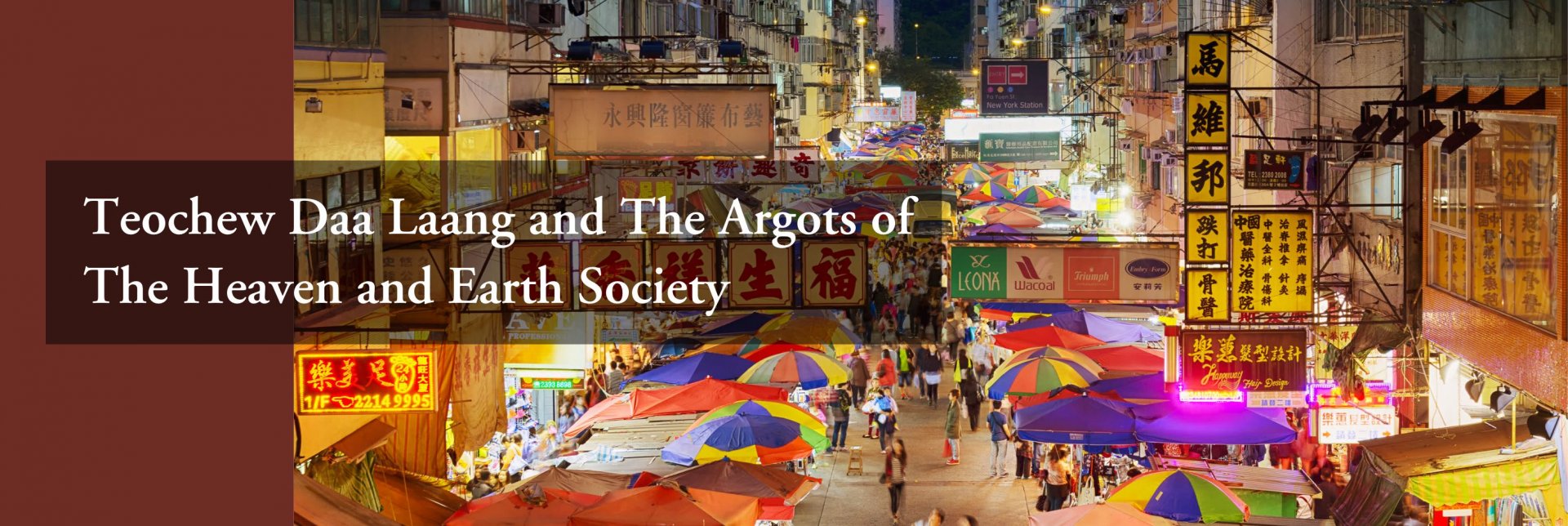Teochew Daa Laang and The Argots of
The Heaven and Earth Society
Abstract:
Introduced from Hong Kong to the Chaoshan regions (潮汕地區), the Hong Kong special delicacy Daa Laang (打冷) has become an important part of the local food culture of Teochew (also called as Chiu Chow). The origination and evolution of the local Teochew Daa Laang (潮州打冷) reflects the economic activities and the living conditions of the community in early Hong Kong. There are various types of opinions about the origin of the term Daa Laang. The author has earlier quoted from the article of Professor Lin Lunlun Dialectal Tea-Talk: A Search for Daa Laang, Daa Laang in Teochew is related to the argot of the Heaven and Earth Society. The author tried to trace the origin of parlance through the research of the history of factions of the Heaven and Earth Society (天地會) in Hong Kong from 1841. To show the transmission of the faction from a secret anti-government organization to a special social welfare community. The argots of the Heaven and Earth Society were prominent between labors in Hong Kong during this period. Teochew congee with Teochew salty snacks (潮州雜鹹, special snack in Teochew, which include Teochew pickles, nut and even seafood) were the main meal of the Hong Kong labors who came from Teochew. They called "食粥" (means "eat congee") as "打浪" (pronounce in Teochew is Pah2 Lang6), "打浪" was always be expressed as "啪唥" (pronounce in Teochew is also Pah2 Lang6) in Teochew culture. With the improvement of the living condition. Many snack booth (大排檔, a type of open-air food stall, always called as "Dai Pai Dong", pronounce Daai6 Paai4 Dong3 in Cantonese) which selling Teochew congee, started to display various marinated delight (滷味, a type of dishes which made by braising in the sauce known as master stock) in conspicuous place to attract customers and sold with rational price, hence these food evolved to a type of food culture, which named as "Daa Laang" and popular with Hong Kong people.

Minnan region is the birthplace of the Heaven and Earth Society, also known as "Triad"(三合會) or "Hong Men"(洪門), which was a secret organization that carried out "Overthrow of the Qing dynasty and the restoration of the Ming dynasty of Han nation" (反清復明) in the late Ming and early Qing dynasty. To against the suppress from Qing government, A system of argot and rites suitable for internal use was created by the members. The Heaven and Earth Society has established the Hong Kong faction in 1842. Although the British colonial government legislated twice for the imprisonment and deportation of suspected Triads in 1845. The new immigrants were still the advocates of Triad of the Heaven and Earth Society, as they need the protection and relief to survive in Hong Kong.
The early British colonial government relied on the autonomy of the Chinese community and the Chinese community did not prove social welfare service to new immigrants, so the lack of community services gave the Triad Societies an opportunity to take advantage of the situation to grow. The Triads set up various labor organizations to meet the needs of the new immigrants by housing new arrivals, introducing jobs to them and providing job security for them. The more members joined the gang, the more prestige they had in that district and the greater power they had to undertake various kinds of work. According to the book Hong Kong Stories (《香港掌故》) Lu Yan (魯言, 1924-1995), after 1841 there was no union in Hong Kong. Many labor workers had to join the association to maintain their jobs, because if the gang won a project, all members in that gang would have a job. Take the dock coolies (咕哩, means labor workers) as an example, they were divided into many gangs, and the more members the gangs had, the more they were able to contract for various jobs, so all the members of the society will have a steady income, this is why there were many small gangs during that period. According to the British colonial records, in the early 19th century, there were 26 triad societies in Hong Kong, with 15,000 to 20,000 members. Among the 23,000 residents in Hong Kong then, 22,000 of them were Chinese. That means about three quarters of Chinese residents joined the Triads. Almost every Coolie Store (咕哩館, storeroom of labors in dock) were the meeting place of Triad Societies. There were even Triad members among the employees of the British Hong Kong Administration, the Shipping Department, the Secretary for Home Affairs, the High Court, and the Inspector General's Office, as well as Chinese police officers.
Triads in Hong Kong then can be mainly classified as two types. The first type was the triad of the Heaven and Earth Society, which originated in mainland China and had already established a in Hong Kong during the period of Emperor Daoguang in the Qing Dynasty because many members fled to Hong Kong due to the suppression of Qing Government. In 1847, Hong Kong Island had already become an important stronghold for the Triads in southern China. Therefore, this type of Triad societies had some political slant and undertook a mission of national rejuvenation. The other type of Triad Societies mainly originated in the local gangs, which sourced from coolie store, family groups (家族團體), martial arts societies (國術館), and associations (同業商會). According to the accounts of the foreign police inspector Morgan, M. P in Triad Societies in Hong Kong, these gangs were not necessarily professional criminal organizations in the early days, but mainly engaged in resisting bullying from other ethnic groups and protecting the interests of union or natives' associations. They were different from the triad societies that now call themselves as "Hong Men", which threaten the public to pay protection racket and that endangers society.
All articles/videos are prohibited from reproducing without the permission of the copyright holder.




Welcome to leave a message:
Please Sign In/Sign Up as a member and leave a message